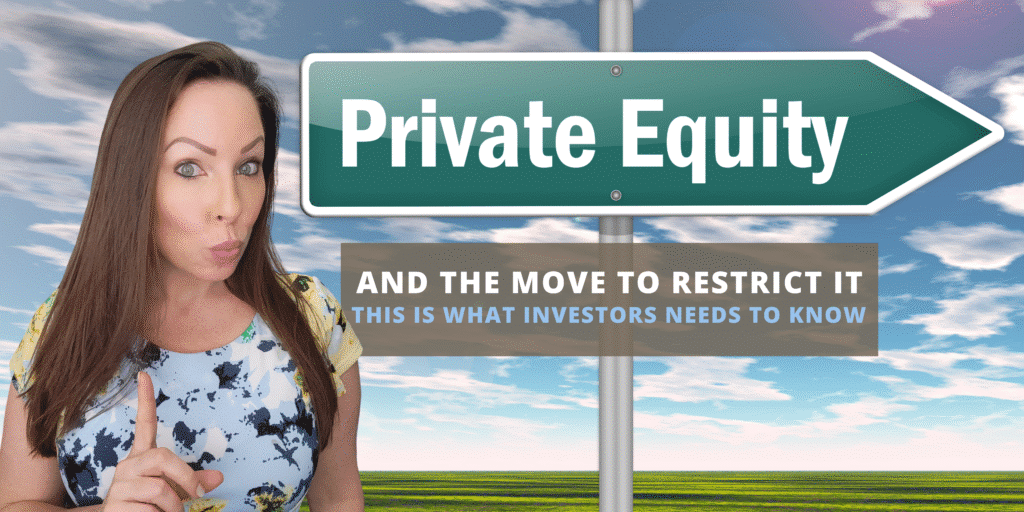
Why The Government Is Cracking Down On Private Equity & What You Need To Know
Private equity has always lived in a bit of a gray area—powerful, lucrative, and often shrouded in mystery to the average investor.
But recently, the veil is lifting. Canadian regulators and governments around the world are taking a closer look at how private equity firms operate, especially in areas like real estate, long-term care, and essential services.
So, why the sudden crackdown? And what does this mean for investors like you?
Let’s break it down.
First, What Is Private Equity?
Private equity (PE) refers to investment firms that buy private companies—or take public companies private—with the goal of improving profitability and later selling them at a higher value. It sounds harmless enough. In theory, PE firms inject capital, expertise, and operational efficiency into businesses. The profits come from cutting costs, restructuring operations, and selling the company at a markup.
But that’s the polished version.
In practice, PE ownership often means aggressive cost-cutting, job reductions, higher fees for end consumers, and sometimes even bankruptcies if the debt load becomes unsustainable. Unlike publicly traded companies, PE-backed companies have far less oversight or public accountability.
Why the Government Is Paying Attention
Canada, like much of the world, is dealing with soaring housing costs, stressed health care systems, and increasingly fragile long-term care infrastructure. And guess what industry has been quietly investing in all of these sectors?
Private equity.
In Ontario, for example, a growing number of long-term care homes are owned by private equity firms and real estate investment trusts (REITs). During the COVID-19 pandemic, these facilities saw disproportionately high death rates compared to non-profit and municipally run homes. A major 2021 report by the Ontario Health Coalition even found that for-profit homes had 78% higher death rates.
That’s a red flag regulators couldn’t ignore.
In real estate, private equity funds have been quietly scooping up multi-residential housing across Toronto and the GTA, often outbidding mom-and-pop landlords. The concern here is that these funds are treating housing like a short-term profit engine—renovicting tenants, raising rents, and contributing to affordability challenges.
In the U.S., similar patterns have been observed, which is why both the Biden administration and the FTC have begun cracking down on PE-backed acquisitions, especially in health care.
Now, Canada is following suit.
What Are the Government’s Proposed Moves?
Several key restrictions and regulations are in the pipeline or being discussed:
- Tighter Regulations in Long-Term Care
Some provinces are considering limits on for-profit ownership of health care facilities and exploring more transparent reporting requirements for privately owned operators. - Housing Acquisition Limits
The federal government’s Housing Accelerator Fund is offering incentives to municipalities that build more affordable housing stock, while discussing limitations on institutional investors like PE firms buying up single-family or multi-family homes. - Transparency and Taxation
The CRA and provincial regulators are looking to increase scrutiny of private equity tax strategies, including the use of limited partnerships and offshore structures. Expect more disclosure requirements and possibly higher taxes on carried interest. - Anti-Trust and Competition Reviews
The Competition Bureau is beginning to explore how PE-fueled consolidations could harm consumer choice—especially in sectors like telecom, retail, and health care.
What Should Investors Watch Out For?
If you’re an investor—whether directly into private equity, or through a fund that holds PE assets—here are a few key considerations:
1. Regulatory Risk Is Rising
The golden age of light-touch regulation is ending. Firms may face compliance costs, delays, or outright blocks on acquisitions, especially in sensitive sectors.
2. Due Diligence Needs to Go Deeper
It’s not enough to analyze an investment’s profit potential. You also need to evaluate its reputational risk, social impact, and likelihood of government intervention. ESG (Environmental, Social, Governance) metrics aren’t just PR—they’re becoming core to risk management.
3. Housing and Healthcare Are Now Political Issues
If your private equity investment strategy relies on rent hikes or cost-cutting in public-facing industries, expect more scrutiny. Governments are positioning housing and healthcare affordability as election-winning issues. Investors could find themselves in the crosshairs.
4. Shifts Toward Retail Access Are Slowing
There’s been a surge in retail-facing private equity products—like mutual fund structures offering PE exposure. But if regulation tightens, retail access may become more restricted or costlier to access.
Final Thoughts
Private equity is not going away—but it is changing. As governments lean into affordability, transparency, and social impact, the way private equity operates will need to evolve.
For savvy investors, this isn’t a reason to run from PE—it’s a reason to be smarter about it.
Look for funds that take a long-term, ethical approach. Be wary of short-term profit plays that could become tomorrow’s headlines. And most importantly, remember that real wealth isn’t just about ROI—it’s about sustainability, resilience, and impact.
Sources & Further Reading:
- Ontario Health Coalition: https://www.ontariohealthcoalition.ca/
- CBC News on REIT ownership in long-term care: https://www.cbc.ca/news/canada/long-term-care-for-profit-1.5747810
- Canadian Housing Accelerator Fund: https://www.cmhc-schl.gc.ca/en/professionals/project-funding-and-mortgage-financing/funding-programs/all-funding-programs/housing-accelerator-fund
- Financial Post on PE scrutiny: https://financialpost.com/investing/private-equity-scrutiny-affordable-housing
Let’s build wealth the smart way – together!
And, if you’re thinking about buying, selling or investing in Durham Region or Toronto, let’s chat! I can be reached at 647-896.6584, by email at info@serenaholmesrealtor.com or by filling out this simple contact form. You can also kick off your search for Durham Region homes for sale by clicking here.
In addition, make sure we’re connected on social and you’ve subscribed to my YouTube Channel. And, for other articles specific to real estate investing, click here.










